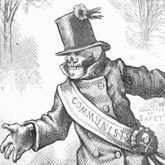|
To be fair, Hindenburg was barely above vegetable status by 1932.
|
|
|
|

|
| # ? Jun 10, 2024 00:10 |
|
Soviet Space Dog posted:France transferred roughly 20% of GDP in 3 years after the Franco-Prussian war, it didn't cause France to explode. They didn't get off scot-free, though. I'm not familiar with how government finances were handled back then, but I do know that the Franco-Prussian war killed like 1/10th of the people that WWI did and lasted about 9 months. They're not really comparable situations. Electronico6 posted:So really, we ended up with Nazis cause a WW1 ex-general was more afraid of social democrats and communists, than he was of fascists. Doesn't sound like Hindenburg was really "afraid" of fascism, but I understand how the Nazis maneuvered themselves to the top now.
|
|
|
|
Kavak posted:They didn't get off scot-free, though. I'm not familiar with how government finances were handled back then, but I do know that the Franco-Prussian war killed like 1/10th of the people that WWI did and lasted about 9 months. They're not really comparable situations. Yes, France didn't get off scot-free, and still managed to pay off a similar amount (as % of GDP) to Germany ahead of schedule in under half time without destroying itself. There was a world wide depression in the post-war period, but then you had people in Germany saying that the reparations ruined Germany's economy.
|
|
|
|
Soviet Space Dog posted:Yes, France didn't get off scot-free, and still managed to pay off a similar amount (as % of GDP) to Germany ahead of schedule in under half time without destroying itself. There was a world wide depression in the post-war period, but then you had people in Germany saying that the reparations ruined Germany's economy. Thank you pointing out how I undermined my own argument.
|
|
|
|
Soviet Space Dog posted:Yes, France didn't get off scot-free, and still managed to pay off a similar amount (as % of GDP) to Germany ahead of schedule in under half time without destroying itself. There was a world wide depression in the post-war period, but then you had people in Germany saying that the reparations ruined Germany's economy.
|
|
|
|
Kavak posted:What happened in Germany, then? What made the Great Depression bring down the republic? What brought the Nazis to power, instead of the DNVP, or the communists? I know this is kind of outside the scope of the thread, but I'd like to get some kind of consensus on what Versailles was and was not responsible for. The Great Depression and austerity policy, coupled with a generally dysfunctional political system. I shall write a completely inadequate summary below. Versailles was a tough deal to swallow, and hyper-inflation wasn't particularly fun. But by 1924, the currency is stabilized, the economy is doing reasonably well, the Beer Hall Putsch (and the earlier Kapp Putsch) has failed, Hitler is in jail (although only for a year), and Germany and the western powers are at least talking about how Germany is going to wind up paying her reparations. In 1925 comes Locarno, which is essentially Great Britain, France, Belgium, Italy and Germany deciding they were cool with where the borders were in the west, which is a small positive sign at least. The Rhineland is also evacuated (after being occupied by the French and Belgians) in 1925 as well. Germany also reaches an accord with the Soviets. Things look decidedly less rosey for Poland, but nobody important seems to care too much. The German government is doing relatively well too, and democracy is maybe starting to take hold. The Social Democrats form the largest share of the Reichstag in every election, and much of the remainder is composed of relatively moderate conservative types; although the national government is reliant on very shaky coalitions (led almost entirely from the right), they get by. The provincial Prussian government is importantly controlled by a moderate Social Democrat, Otto Braun, for essentially the entirety of the Weimar Republic. Then comes 1929, and the associated crash on Wall Street. The various plan for German reparation repayment had been dependant on loans from America, which worked well enough for everybody involved, right up until the money dried up. With American banks panicking and unwilling to lend to Germany, the economy starts to tank. Unemployment is rising, and the coalition government collapses. And election is held, the Social Democrats remain the largest party, but the Nazi party is now the second party, having taken some 18% of the vote (they had taken <5% in all previous elections). President Hindenburg (now 83, how he's still around is another story) eventually appoints the rather conservative Bruning to be Chancellor. Bruning now embarks on one hell of a draconian austerity program; this both appeals to him and his fellow conservatives from an ideological perspective, but without anyone to lend to them, I don't know that he had any alternatives either. This policy only made things much, much worse. Also notable is that there was no Parliamentary consensus for any of this, as the precise distribution of seats made any coalition impossible. So Bruning did it by governing by decree, backed up by Hindenburg. Amidst growing discontent, Hindenburg replaces Bruning with Franz von Papen in 1932. von Papen, again depending on emergency powers and decrees, backed by Hindenburg. Although only Chancellor for a short period, he accomplished two very important things. First, hoping to gain the support of the growing power of the Nazi Party, he removed the ban on the Sturmabteilung (SA), better known to us anglophones as the Brownshirts. This rapidly leads to street battles between the SA and the Communists in Berlin, and gives the pretext for von Papen's second big 'acheivement', the Preussenschlag (Prussian Coup). Citing the disorder in the region, von Papen appointed himself the emergency leader of Prussia, giving himself control over the Prussian government, including the Prussian police, by far the most powerful civilian force in the country. However, von Papen still lacked any majority in the Reichstag, and new elections brought even more power to the Nazis (32% of the vote). von Papen stepped down, was breifly replaced as Chancellor by General Kurt von Schleicher (who was actually instrumental in getting Bruning and von Papen appointed in the first place) who failed to establish any sort of government, and was eventually replaced by the man himself, Adolf Hitler. Hitler is now Chancellor of Germany, and in control of the massively powerful Prussian government. You know the rest of the story. The political wrangling in 1930-1933 period is profoundly important, but I really don't know enough to do it justice. But the gist of it is that the failure of the government to deal with a mounting economic crisis created a large group of disgruntled people willing to back a hyper-nationalist party. Hitler also got a lot of help at the right time (1930) from the right wing media, that gave him a ton of publicity because he was supporting a referendum position that would have stopped all reparation payments. Said measure failed completely (it got >90% of the vote, but only on a 20% turnout, and needed 50%), but the whole thing does show that Versailles did still cast a long shadow on German politics. But it's still very wrong to say that Versailles + 15 years = Nazis.
|
|
|
|
Kavak posted:
Hindenburg was born to a junker family, he was an aristocrat of the old order. Fascism does share some things with communism, even if thinks of them in different mindsets, one of them was not thinking much of old aristocrats and their status. Before 1932, you had Hindenburg declaring that he would never allow Hitler to get a post higher that the manager of postal services. Yet he gives him the Chancellor spot, because his conservative parties weren't supporting him, or getting together to defeat the left. Hindenburg knew very well what the Nazi party meant, they were having street wars in plain day, but he preferred some image of the Right, than the Left on power. He like, Papen, also believed that they had Hitler contained with the deal, but Hitler, Goering, and Goebbels would run circles with these clowns, until they managed to get rid of them and do what they wanted. One could fault the man like Shimrra Jamaane says; that he was old and barely alive, but being a fraud is something that defines Hindenburg. In 1918 he was one of the first to urge the civilian government to plan a ceasefire, only for later to declare them traitors to the fatherland. He was a personal friend and supporter of various social democrats, but sold them all out when opportunity arose. I think it's fair that history will remember Hindenburg as a giant balloon that caught fire and crashed ingloriously. Electronico6 fucked around with this message at 00:39 on Feb 25, 2014 |
|
|
|
Electronico6 posted:One could fault the man like Shimrra Jamaane says; that he was old and barely alive, but being a fraud is something that defines Hindenburg. He also took a lot of credit for things the officers under his command did during the war, plus Ludendorff. PittTheElder posted:But it's still very wrong to say that Versailles + 15 years = Nazis. So in short, Hitler's rise was more a product of who was in charge of Germany when the Depression hit and how they and the German people responded than the reparations?
|
|
|
|
There was also assumption that like the other far right assholes running around Germany in the general time period, once the Nazis were in power they'd settle down and pull along with standard conservative policies - which to be honest for much of the conservatives in Germany at the time WOULD include removing democracy and possibly getting back a good old fashioned monarchy or pseudo-monarchy. But they weren't expecting the Nazis to actually keep to their word rather than use their rhetoric to scare up votes.
|
|
|
|
Kavak posted:So in short, Hitler's rise was more a product of who was in charge of Germany when the Depression hit and how they and the German people responded than the reparations? Precisely.
|
|
|
|
Soviet Space Dog posted:France transferred roughly 20% of GDP in 3 years after the Franco-Prussian war, it didn't cause France to explode. Uh as others have said the early French third republic wasn't exactly that stable, especially since it was in crisis for much of the 1870s over the republic/monarchy issue. Also, Germany was impacted in a very different way by the war then France was, including economically and its debt from the war. quote:Total spending by the national government reached 170 billion marks during the war, of which taxes covered only 8%, and the rest was borrowed from German banks and private citizens. Eight national war loans reached out to the entire population and raised 100 million marks. It proved almost impossible to borrow money from outside. The national debt rose from only 5 billion marks in 1914 to 156 billion in 1918. These bonds became worthless in 1923 because of hyperinflation.[56][57] quote:Precisely. Its a simplistic interpretation though because the reparations already had impact on Germany's political landscape before the Nazis became a political force on its own. It wasn't a direct cause but one indirect one which included also the political cleavages of the German Revolution and the foundation of the Republic itself. Ardennes fucked around with this message at 01:12 on Feb 25, 2014 |
|
|
|
Kavak posted:Doesn't sound like Hindenburg was really "afraid" of fascism, but I understand how the Nazis maneuvered themselves to the top now. I didn't see it mentioned in Electronico6's bit above, but if you want a very thorough and well-written book on the end of Weimar and Nazi assumption of power, you could do a lot worse than Hitler's Thirty Days to Power by Henry Ashby Turner Jr. Among other things, it casts into sharp relief just how dysfunctional parliament had become and how utterly reliant on the President's emergency powers it was by 1933, as well as what a little weasel von Papen was. But this is headed more into WWII chat, so I'll just leave it at that.
|
|
|
|
Captain_Maclaine posted:. Historically, I think everything up to 1933 probably should be considered the aftermath of WW1. If I had to divide the two periods, I would say the enabling act would be it (ignoring Japanese political history for a second). Japan was a bit more gradual, and you could probably pick any of the attempted coups from 1931 to 1936.
|
|
|
|
Ardennes posted:Historically, I think everything up to 1933 probably should be considered the aftermath of WW1. If I had to divide the two periods, I would say the enabling act would be it (ignoring Japanese political history for a second). It was more I had just typed up a paragraph about the short-lived coalition cabinet with Papen and other non-Nazis and the Reichstag fire and all, before realizing I was moving enough away from the first war that I ought probably stop. I've always been interested in the parallel periods of domestic unrest in the three future Axis nations between the wars (though certainly future Allies like France weren't exactly havens of stability either for that matter), what with the rise of the blackshirts in Italy, the political combat leagues in Germany (with the SA eventually coming out as the dominant one), and the "period of rule by assassination" in Japan with various army conspiracies and patriotic paramilitaries doing their level best to murder democratic government/politicians. I think that if there's one thing we can all agree on is that the Great War did significant damage to the legitimacy of the idea of classic liberal democracy, which only became more pronounced when the world economy went tits up in 1929.
|
|
|
|
Ardennes posted:Uh as others have said the early French third republic wasn't exactly that stable, especially since it was in crisis for much of the 1870s over the republic/monarchy issue. Yes, an unstable country still managed to pay a similar level without it decimating their economy.
|
|
|
|
Soviet Space Dog posted:Yes, an unstable country still managed to pay a similar level without it decimating their economy. A different country with very different debt levels such as the info I already posted. The issue was that debt was already in addition to the internal debt Germany had already taken on. quote:By 1873, the decreasing value of silver made it profitable to mint silver in exchange for gold at the Union's standard rate of 15.5 ounces to 1. Indeed, in all of 1871 and 1872 the French mint had received just 5,000,000 francs of silver for conversion to coin, but in 1873 alone received 154,000,000 francs. Fearing an influx of silver coinage, the member nations of the Union agreed in Paris on January 30, 1874, to limit the free conversion of silver temporarily. By 1878, with no recovery in the silver price in sight, minting of silver coinage was suspended absolutely.[6] From 1873 onwards, the Union was on a de facto gold standard. Also, the monetary circumstances were fairly different. Frankly, the more I look the more differences I see and since your citing a direct comparison you probably should show they were not in comparable budgetary positions at the time since printing money was a budgetary solution as the time. Edit: Here is something I found on Jstore for those interested. quote:AFTER the Franco Prussian War of I870-7I, Germany exacted Sounded like France mostly paid for it through loans. This is comparable to how WW1 loans were conducted from 1921 to 1924 quote:The London Schedule of Payments, of 5 May 1921, established "the full liability of all the Central Powers combined, not just Germany alone," at 132 billion gold marks.[46] This sum was a compromise, promoted by Belgium (against higher figures demanded by the French and Italians and the lower figure the British supported), that "represented an assessment of the lowest amount that public opinion ... would tolerate."[47] As part of the Dawes Plan, Germany was loaned 800 million to stabilize its currency. Ardennes fucked around with this message at 03:16 on Feb 25, 2014 |
|
|
|
While I like the economic theory the Sonderweg theory also deserves mention. Basically, that Germany, unlike England and France, followed a sort of half-modernization (for example, you still have guilds in a fully industrialized society) and this had rather unfortunate psychological consequences. While I like pointing out that Germany followed a "sonderweg" I think this sort of analysis is useful because it allows us to point to other countries that also followed a "sonderweg". Personally, I think that saying how Britain and France entered modernity is the same is insane. I'd rather argue that there are multiple paths and how they are taken does have a huge influence on society. Also, signaling Germany's development out as predestined to give rise to Nazism seems a little too pat an analysis. Given my wishy-washy analysis of history, I'm less inclined to view Nazism and Germany as isolated cases. During the Great Depression, America flirted with Fascism. Italy, Spain, South Africa, the list goes on. I mean, Bush, hello! And while the industrialization of civilian slaughter was taken to new heights in Nazi Germany it's not like minorities ever fared well during times of trouble (blood libel, pogroms, Armenians, Chechens, Tutsis . . . all that poo poo). I'd be interested to see if anyone has a historical analysis arguing Germany was more down with crazy civilian casualties and taking a bite out of themselves because of the horror that was the 30 Years War. It's special, but it's not that special. Does that make sense?
|
|
|
|
Yes, pretty much every important European country has had its own "Sonderweg theory" (for example the Nairn-Anderson thesis for the UK), which is why most historians outside of a few specialised fields don't take it seriously now -- at least not without major qualifications. It assumes the existence of a "normal" trend of development which simply isn't there historically. Donald Sassoon discusses this in One Hundred Years of Socialism and suggests the Sondwerg theories ultimately originated in the fact that in the 20s every European socialist party was trying to find ways to explain why their country had deviated from the ideal expectations of Marxist and socialist theory, which, given that it was ideal, couldn't specifically account for any given particular case.
|
|
|
|
Soviet Space Dog posted:Yes, an unstable country still managed to pay a similar level without it decimating their economy. Similarly, while it may not have utterly decimated the German economy, the peace terms of First World War did not ensure a permanent peace between France and Germany. Fighting a war with France under favorable terms in order to reclaim their lost territory was a major focus of German policy in the years leading up to the Second World War. Powerful actors within German society had little interest in preserving the peace because they thought war would let them take back their lost territory and restore their national pride. It's almost like the peace treaty that ended the World War failed to accomplish it's intended goal of preventing a second World War!
|
|
|
|
With all the interwar Germany chat, I'm reminded of a biography about Hugo Eckner I read a few years back. I know counterfactual discussion is unprofessional and the "great men" view of history is laughable at best, but does the thread think Hugo Eckner actually running for presidency would have prevented the Nazis from taking power?
|
|
|
|
|
Estimating the "value" of the Versailles reparations is extremely difficult, since it involved a byzantine bureaucracy, multiple methods of payment and was continually altered over time. Local war debt was wiped by the hyperinflation, which was politically sold domestically by blaming it on the reparations instead of things like the low taxes (lower than other countries) Germany was levying at the time. Yes, German reparations were eventually paid for by American debt, and some historians argue that Germany got more out of defaulting on that than ever paid for in reparations (see American 'Reparations' to Germany, 1919-1933)
|
|
|
|
Dave47 posted:It may not have utterly decimated the French economy, but the peace terms of the Franco-Prussian war did not ensure a permanent peace between France and Germany. Fighting a war with Germany under favorable terms in order to reclaim their lost territory was a major focus of French policy in the years leading up to the World War. Powerful actors within French society had little interest in preserving the peace because they thought war would let them take back their lost territory and restore their national pride. Luckily we had WWII's post-war settlement to guide us on they should have done it! Widespread occupation by foreign military forces (which lasted for decades), being broken up into smaller states and larger territorial losses than Versailles. Let's not forget the basically ethnic genocide on Germans outside the new borders.
|
|
|
|
Soviet Space Dog posted:Estimating the "value" of the Versailles reparations is extremely difficult, since it involved a byzantine bureaucracy, multiple methods of payment and was continually altered over time. Local war debt was wiped by the hyperinflation, which was politically sold domestically by blaming it on the reparations instead of things like the low taxes (lower than other countries) Germany was levying at the time. Yes, German reparations were eventually paid for by American debt, and some historians argue that Germany got more out of defaulting on that than ever paid for in reparations (see American 'Reparations' to Germany, 1919-1933) Fine it is difficult, but that was why the data was presented. Ultimately, it was different circumstance, but still it was difference of circumstances that are completely relevant today. The ability to access credit market is one of the most decisive if not the decisive feature of not just the 20th century but the entire modern era (or longer, but wrong thread). Percentage points can make the difference of lives. quote:Luckily we had WWII's post-war settlement to guide us on they should have done it! Widespread occupation by foreign military forces (which lasted for decades), being broken up into smaller states and larger territorial losses than Versailles. Let's not forget the basically ethnic genocide on Germans outside the new borders. The post-war settlement still had devastating effect beyond it effect Germans. If anything, it is actually relatively impossible to figure out its effect since MAD post 1945 complicated the issue. Ardennes fucked around with this message at 05:31 on Feb 25, 2014 |
|
|
|
Dave47 posted:Similarly, while it may not have utterly decimated the German economy, the peace terms of First World War did not ensure a permanent peace between France and Germany. Fighting a war with France under favorable terms in order to reclaim their lost territory was a major focus of German policy in the years leading up to the Second World War. Powerful actors within German society had little interest in preserving the peace because they thought war would let them take back their lost territory and restore their national pride. The issue with this is that Germany's claims never involved France directly. I've never read anything suggesting that Germans were particularly broken up about having to return Alsace-Lorraine; instead what they wanted back was the territory that had been given to Poland, and maybe some revisions of the border with Czechoslovakia in Silesia. That's exactly what the Locarno Treaties were about. There was the little issue of the Cordon Sanitaire, but odds are they could have maneuvered around that one eventually.
|
|
|
|
Soviet Space Dog posted:Luckily we had WWII's post-war settlement to guide us on they should have done it! Widespread occupation by foreign military forces (which lasted for decades), being broken up into smaller states and larger territorial losses than Versailles. Let's not forget the basically ethnic genocide on Germans outside the new borders. PittTheElder posted:The issue with this is that Germany's claims never involved France directly. I've never read anything suggesting that Germans were particularly broken up about having to return Alsace-Lorraine; instead what they wanted back was the territory that had been given to Poland, and maybe some revisions of the border with Czechoslovakia in Silesia. That's exactly what the Locarno Treaties were about. The military catastrophe of the First World War is book-ended by the catastrophic failures of Europe's political class to either prevent the war or to ensure any sort of lasting peace after the war.
|
|
|
|
All I'm trying to argue is that while Versailles did fail to secure the peace, it's failure was not a sure thing. There probably would have been a war either way, but there's probably lots of ways for it to avoid becoming a Great Power struggle.
|
|
|
|
The interpretation I picked up in class is that the structure of Versailles meant that there would be another European war, pretty much at some point, unless it was abrogated - but it did not guarantee Naziism or anything. That said while I think talk about the post-war period makes sense, getting into WWII is sort of its own thing and is already done to death. Does anyone know much about the Easter Rising and the possible German involvement?
|
|
|
|
|
I saw that there was some Sassoon and Own posted earlier in the thread, so I thought I'd throw in my two cents about war poetry. Far and away the eeriest stuff comes from Rupert Brooke1. Peace posted:Now, God be thanked Who has matched us with His hour, And then four years later you have Sassoon talking about driving a tank through someone's party to see how they like it.
|
|
|
|
Nessus posted:Does anyone know much about the Easter Rising and the possible German involvement? The sole German involvement was their selling Franco-Prussian war era firearms to the republicans for a tidy sum, and I believe that wasn't even that successful (it's been a while since I did any reading on the run up to the Rising). That the Rising happened during the war was mostly an "England's difficulty is Ireland's opportunity" thing.
|
|
|
|
Forums Terrorist posted:The sole German involvement was their selling Franco-Prussian war era firearms to the republicans for a tidy sum, and I believe that wasn't even that successful (it's been a while since I did any reading on the run up to the Rising). That the Rising happened during the war was mostly an "England's difficulty is Ireland's opportunity" thing. It was successful, but the guns were sold and transported in 1914 before the war even began. Also, in 1916, Casement travelled to Germany via the United States where he presented a plan for the Germans to land a force in Ireland to support a mass rebellion. For obvious reasons, the Germans didn't go for it, but iirc they did offer to allow Casement to try and recruit troops for the Rising from Irish POWs.
|
|
|
|
Dopilsya posted:It was successful, but the guns were sold and transported in 1914 before the war even began. Also, in 1916, Casement travelled to Germany via the United States where he presented a plan for the Germans to land a force in Ireland to support a mass rebellion. For obvious reasons, the Germans didn't go for it, but iirc they did offer to allow Casement to try and recruit troops for the Rising from Irish POWs. The recruitment didn't work but the Germans also tried to transport arms to support rebels prior to the rising, the vessel was a captured British merchant ship that they called the Aud, but it was discovered and scuttled which seriously undermined the rising. Casement tried to stop the rising from going underway after he was returned to Ireland (it was looking like a comedy of errors at this point, all of the German attempts to assist had ended in failure and Eoin Macneill had withdrawn his support along with most of the Irish volunteers after he discovered the IRB had duped him with a forged letter that the British were going to arrest him and other Nationalist leaders) but was arrested by the British and executed after the Rising was dealt with with the help of some incriminating documents detailing his homosexuality.
|
|
|
|
Dave47 posted:I'm not claiming that the origins of World War 1 and 2 are perfectly parallel, and I'm certainly not arguing that the settlement that ended World War 2 was an ideal outcome! I'm trying to make the point that the Versailles peace agreement was an abject failure in that it helped to bring about the war that it was supposed to make impossible. And how exactly do you think it could have stopped? Versailles was systematically dismembered during the inter-war period, so by the start of World War 2 you would have had something similar to the sort of neutral treaty everybody seems to think should have happened. Then Germany launched another war with similar aims to World War 1 but managed to make it worse.
|
|
|
|
Soviet Space Dog posted:And how exactly do you think it could have stopped? Versailles was systematically dismembered during the inter-war period, so by the start of World War 2 you would have had something similar to the sort of neutral treaty everybody seems to think should have happened. Then Germany launched another war with similar aims to World War 1 but managed to make it worse. At the risk of veering too much into World War 2 chat, Versailles was not "systematically dismembered" until the Nazis rose to power. At that point, allowing Versailles to morph into a "neutral treaty" is closing the barn door after the horse has escaped. I don't know "how exactly" World War 2 could have been stopped because alternate history is a murky land of what-ifs. But we shouldn't rebel against the murkiness by pretending that past events were pre-ordained. Europe's political class could have prevented the July Crisis from turning into a World War, and they could have crafted a better peace. I feel the Franco-Prussian War is an apt comparison because it's "peace settlement" made revanchism into an incredibly powerful forces in French politics. It didn't make war inevitable, but it made war more likely. Revanchism led the French Republic to form a military alliance with ideologically-incompatible Czarist Russia and bury the hatchet with England because France realized that they needed strong allies to beat the Triple Alliance. This made it more likely that the "second Franco-Prussian War" would instead be a World War. Wiser politicians should have realized in 1918 that the "war to end all wars" demanded a peace settlement that wouldn't contain within it the seeds of a new war. Or, at the very least, wiser politicians should have done their best to keep the number of those seeds to a minimum.
|
|
|
|
It was largely dismantled though. Perhaps the largest issue was the reparations payments, and the scheme for those was revised multiple times in Germany's favor. The other sticking point, borders in Eastern Europe, wasn't much of one, because the Western Allies were clearly willing to make concessions there.
|
|
|
|
Dave47 posted:At the risk of veering too much into World War 2 chat, Versailles was not "systematically dismembered" until the Nazis rose to power. At that point, allowing Versailles to morph into a "neutral treaty" is closing the barn door after the horse has escaped. I don't know "how exactly" World War 2 could have been stopped because alternate history is a murky land of what-ifs. But we shouldn't rebel against the murkiness by pretending that past events were pre-ordained. Europe's political class could have prevented the July Crisis from turning into a World War, and they could have crafted a better peace. Granted, that was ultimately the hope (especially from the Germans) with Wilson coming to the Peace Conference, it didn't work out that way. Anyway, if anything the situation after WW1 was worse (as I laid out before) because Germany's credit situation and its ability to borrow to pay war debts was very limited and the allies demanded resources "in kind." France borrowed the money to pay off its reparations which smoothed out the amount of damage that was done while the allied demanded resources then and there and in fact invaded the Rhineland at one point to take those resources directly. Obviously the defense was it was needed and the war hurt them as much (or in case of France, more) than the Germans. Maybe if the Great Depression didn't happen, the Weimar Republic could have muddled though for another few years but ultimately there was going to be a big crash because markets were barely regulated. I think the chances of avoiding another war were actually fairly slim, it didn't have to be Hitler obviously but it could have been some other far-right party (the far-left were always too isolated) that would have eventually gotten their way. That said, yes that is going into WW2 history but it is really about how horrible and damaging WW1 itself was and if anything it left a hole in the developed world was was very difficult to fix.
|
|
|
|
It's difficult to talk about WWI without also talking about WWII, I think. There's a reason they've often been treated as two ends of the same long crisis.
|
|
|
|
They were. The first world war ended without solving any of the underlying issues - it was basically a long slog until one side shut up and were forced to stop complaining.
|
|
|
|
Shbobdb posted:While I like the economic theory the Sonderweg theory also deserves mention. Basically, that Germany, unlike England and France, followed a sort of half-modernization (for example, you still have guilds in a fully industrialized society) and this had rather unfortunate psychological consequences. As Zohar explained Sonderweg is very much out of style except for a few areas because it is grounded in the idea of a 'normal' type of historical development, which isn't something that actually exists. Every nation has its own unique path in history, meaning yes, every nation has its own Sonderweg, but the term is loaded and doesn't allow for that universalization. It's a loaded term in the German context because Sonderweg was a theory in academics post WWII that existed largely as a way of explaining Nazism. It was used simultaneously as a way of rationalizing the horrors of Nazism (how could good people do such terrible things?). Nazism was inevitable according to the Sonderweg, and this became a huge issue because what that means in terms of guilt and responsibility. You can't reasonably hold people responsible for a historical inevitability. So the Sonderweg theory is no longer used because, no nation follows a normal progression of history. , but also because Nazism was not the inevitable consequence of WWI.
|
|
|
|
Whoever recommended "The Sleepwalkers," thanks! Really enjoying the book so far. And I have to admire the ballsiness of putting a chapter up front, "here's more than you could ever possibly want to know about pre-war Serbian politics."
|
|
|
|

|
| # ? Jun 10, 2024 00:10 |
|
No WWI thread is complete without "The Band Played Waltzing Matilda." https://www.youtube.com/watch?v=WG48Ftsr3OI e: Jesus, I'm never going to get through this song without breaking down. Mister Mind fucked around with this message at 02:56 on Mar 2, 2014 |
|
|








 Yes, it's like a lava lamp.
Yes, it's like a lava lamp.

















